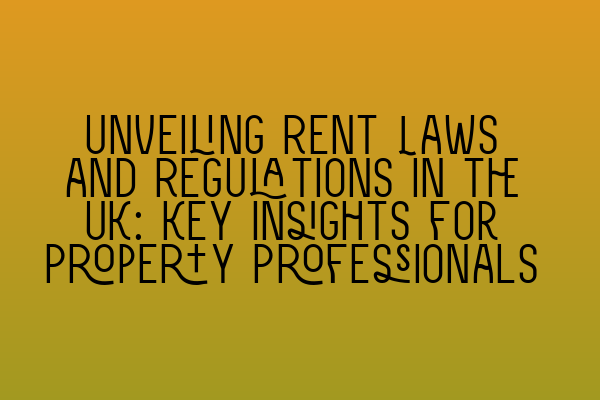Unveiling Rent Laws and Regulations in the UK: Key Insights for Property Professionals
As a property professional in the UK, it is essential to have a comprehensive understanding of the rent laws and regulations in order to effectively advise clients and navigate the complexities of the property market. The field of property law is continuously evolving, and staying up-to-date with the latest rules and regulations is crucial for success.
In this blog post, we will delve into the key insights of rent laws and regulations in the UK, providing you with the necessary knowledge to confidently handle rental properties and disputes. Whether you are a solicitor, property manager, or landlord, this information will help you make informed decisions and ensure compliance with the law.
Rent Act 1977 and Housing Act 1988
The two main pieces of legislation that govern rent laws in the UK are the Rent Act 1977 and the Housing Act 1988. These acts outline the rights and responsibilities of both tenants and landlords and provide guidelines on issues such as rent increases, evictions, and the protection of tenants’ deposits.
Under the Rent Act 1977, tenants have security of tenure, meaning that they have the right to stay in the property for as long as they wish, as long as they comply with the terms of the tenancy agreement. On the other hand, the Housing Act 1988 introduced Assured Shorthold Tenancies (ASTs), which are the most common form of tenancy agreement in the UK. ASTs provide landlords with more flexibility in terms of regaining possession of the property.
Rent Increases and Rent Control
Rent increases in the UK are subject to certain regulations. Under the Rent Act 1977, tenants have the right to have their rent assessments reviewed by a rent officer, who will determine a fair rent for the property. This prevents landlords from unreasonably increasing the rent and ensures that tenants are not unfairly burdened.
However, it is important to note that not all properties are subject to rent control. Properties that fall under the Housing Act 1988, particularly those with ASTs, are not subject to the same level of rent control. Landlords are generally free to set their own rent levels for these properties, provided they comply with the terms of the tenancy agreement and any applicable legislations, such as the Tenancy Deposit Protection scheme.
Tenancy Deposits
To protect tenants’ deposits, the UK government introduced the Tenancy Deposit Protection scheme, which requires landlords to secure tenants’ deposits in a government-approved scheme. This scheme ensures that tenants’ deposits are protected and can be used to settle any disputes at the end of the tenancy. Failure to comply with the Tenancy Deposit Protection scheme can result in severe penalties for landlords.
Evictions and Possession Proceedings
In cases where landlords need to regain possession of their property, they must follow the correct legal procedures. This typically involves serving a notice to the tenant, obtaining a possession order from the court, and potentially engaging a bailiff to carry out the eviction. It is important for property professionals to understand the specific requirements and timelines associated with these processes to ensure a smooth and legal eviction.
It is worth noting that there are certain circumstances in which eviction is not allowed, such as during the COVID-19 pandemic. The government has introduced temporary measures to protect tenants from eviction due to financial hardships caused by the pandemic. Property professionals should stay updated with the latest guidelines and regulations to avoid any legal complications.
Staying Informed and Developing Expertise
Given the ever-changing nature of rent laws and regulations in the UK, it is crucial for property professionals to stay informed and continuously develop their expertise. This can be achieved by attending training courses, webinars, and seminars focused on property law updates.
At SQE Property Law & Land Law, we offer comprehensive SQE 1 and SQE 2 preparation courses for aspiring solicitors. These courses cover a wide range of topics, including rent laws and regulations, to ensure that our students are well-equipped to excel in their property law careers. To complement your studies, we also provide practice exam questions and mocks to help you prepare effectively for the SQE exams. Don’t forget to check out the SRA SQE exam dates to stay ahead of the game.
In conclusion, having a deep understanding of rent laws and regulations in the UK is essential for property professionals to effectively navigate the complexities of the property market. By staying informed and continuously developing your expertise, you can confidently advise clients and ensure compliance with the law. At SQE Property Law & Land Law, we are here to support you in your journey towards becoming a successful property law practitioner.
Related Articles:
– SQE 1 Practice Exam Questions
– SQE 1 Practice Mocks FLK1 FLK2
– SQE 2 Preparation Courses
– SQE 1 Preparation Courses
– SRA SQE Exam Dates
